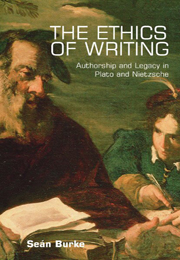Book contents
- Frontmatter
- Contents
- Acknowledgements
- Key to References and Abbreviations
- Prologue: Friedrich Nietzsche in Auschwitz, or the Posthumous Return of the Author
- Introduction: The Responsibilities of the Writer
- Chapter 1 The Ethical Opening
- Chapter 2 The Ethics of Legacy
- Chapter 3 Signature and Authorship in the Phaedrus
- Chapter 4 The Textual Estate: Nietzsche and Authorial Responsibility
- Conclusion: Creativity versus Containment: The Aesthetic Defence
- Bibliography
- Index
Introduction: The Responsibilities of the Writer
Published online by Cambridge University Press: 12 September 2012
- Frontmatter
- Contents
- Acknowledgements
- Key to References and Abbreviations
- Prologue: Friedrich Nietzsche in Auschwitz, or the Posthumous Return of the Author
- Introduction: The Responsibilities of the Writer
- Chapter 1 The Ethical Opening
- Chapter 2 The Ethics of Legacy
- Chapter 3 Signature and Authorship in the Phaedrus
- Chapter 4 The Textual Estate: Nietzsche and Authorial Responsibility
- Conclusion: Creativity versus Containment: The Aesthetic Defence
- Bibliography
- Index
Summary
… a poet is a light and winged thing, and holy, and never able to compose until he has become inspired, and is beside himself, and reason is no longer in him …
(Plato, Ion, 534b)Weave a circle around him thrice,
And close your eyes with holy dread,
For he on honey-dew hath fed,
And drunk the milk of Paradise.
(Samuel Taylor Coleridge, ‘Kubla Khan’)Like writing, reading so often begins in romance and ends in pragmatism. On first looking into the Ion of Plato or Coleridge's ‘Kubla Khan’, the idea of the poet as divinely inspired enthrals. Only later do we recognise that such celebrations are of a piece with the banishment of the poets. The line ‘weave a circle around him thrice’ we either neglect or hazily register in magical, runic terms. Only on rereading do we discern the theme of exclusion, of quarantine, the structure by which society simul – t aneously celebrates and ostracises its artists, only by setting Plato's Republic beside his Ion can we recognise that the very irrationality that exalts and sets the poet apart also makes the poet accountable to – or excluded from – a polis constructed according to the principles of philosophical rationalism. Hence, the perennial lament of the artist that he is both shaman and scapegoat, condemned to live inside and outside, at both the defining, mythopoeic centre yet at the ethical margins of his society.
- Type
- Chapter
- Information
- The Ethics of WritingAuthorship and Legacy in Plato and Nietzsche, pp. 19 - 45Publisher: Edinburgh University PressPrint publication year: 2008



